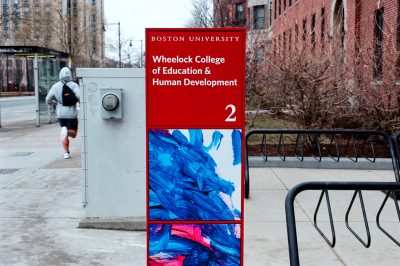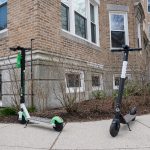
The Boston University Wheelock College of Education and Human Development is launching a “Building Bridges” initiative this month to foster community among the faculty and staff of the newly merged Wheelock College and BU School of Education campuses.
The program, created by former SED professor Swati Kshama Rani and former Wheelock College professor Terry Meier, pairs up staff and faculty members with offices in different buildings at either the Charles River or the Fenway campus.
“A couple things happen in a merger,” Rani said. “One is that people don’t know one another, and then on top of people not knowing one another they’re not all in the same building.”
There are 40 people participating in the program, Rani said. Funds for staff pairs to travel off campus together will be provided by Wheelock Dean ad interim David Chard.
According to Rani, the pairs will meet regularly over the course of the four-month program to get to know one another. In May, at the end of the four months, partners will share what they learned about each other during a spring celebration.
Rani said the inspiration for the program came after considering how the merged schools could “build a bridge” between their varying approaches to teaching education. Although there are gatherings within WED, Rani said this program will build a more personal connection.
“We’ve had a lot of gatherings — it’s not that we don’t — but they end up just feeling like meetings and agendas and PowerPoint and not necessarily just getting to know another person as a human being,” she said.
Rani said that one of the aspects of the program she’s most proud of is the fact that pairings are made up of both faculty and staff members.
“We really encourage partnerships between a faculty member and a staff member because it enhances the idea of equity, diversity and inclusion, which is my passion,” she said. “There’s a staff member that I work with, and just because I’m a professor … that doesn’t mean that getting to know that person isn’t important.”
Rani said a lot of credit for instituting the program goes to Chard for funding it with his own funds.
“When I turned [the proposal] in originally I think it wasn’t scholarly enough,” Rani said. “It wasn’t about the next research coming out or something, and then [Chard] got ahold of it and read it, and he was like, ‘No, we really need something like this to build culture.’”
Rani said she hopes that the program makes a difference in the WED community and becomes a tradition to carry on in future years.
Meier, who is Rani’s faculty partner for the program, said that the Building Bridges initiative provides an important opportunity for faculty and staff to get to know each other.
“In order to become a community that really works together, it’s really important to create a common culture and for people in the two schools to really get to know each other on a totally human level,” Meier said.
Samuel O’Konski, a freshman in the College of Communication, said he thinks that having faculty become closer will create a more positive work environment.
“I think that if the teachers have a friend that they can talk to in the middle of the day, I feel like they’ll be in a better mood,” O’Konski said.
Tyler Campbell, a freshman in the College of General Studies, said that he thinks the program will encourage teachers to engage in greater communication.
“Those teachers can discuss and manage workloads and everything like that,” Campbell said. “Yeah, it would be a good idea for professors to collaborate a little bit more.”
Yazan Aryan, a freshman in the Questrom School of Business, said he thinks this will give Wheelock an opportunity to maintain its small campus appeal within BU’s large campus.
“They have a really unique ability to provide that experience you get at a huge university like Boston University — all the different opportunities you can get being in a huge community, all of that,” Aryan said. “But at the same time, they can still hold onto their values that a small liberal arts college has.”




